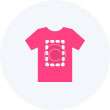Our Services

Welcome
About Us
T-shirt printing in Delhi offers a myriad of creative possibilities. Our T-shirt printing services in Delhi combine innovation and expertise to deliver customized, high-quality prints that cater to diverse needs. With advanced techniques like screen printing, sublimation, and more, we ensure vivid and durable designs on premium fabrics. Whether for promotional events, fashion brands, or individual expression, our team excels in bringing your visions to life. Timely delivery and competitive pricing make us the preferred choice for T-shirt printing in Delhi. Embrace the art of self-expression and style with our top-notch services, leaving a lasting impression with every garment.
Looking for best quality custom Printing tshirts?
“4 type t-shirt printing provides diverse methods like screen printing, heat transfer, Direct To Film printing, and 3D Printing. These options cater to varied designs, fabrics, and quantities, guaranteeing impressive custom apparel.”
That's why you can choose us.
Direct To Print, a leading t-shirt printing company, boasts a successful 12-year journey in the industry. We take pride in our innovative designs, top-notch printing techniques, and premium-quality apparel. With a dedicated team, we’ve catered to diverse clients, establishing ourselves as a trusted name for personalized and stylish t-shirts.
Testimonials
What Our Customers Say
FAQ
Printing Services Frequently Asked Questions

No minimum requirements except screen print
You can just call or WhatsApp us on +91 96508 98238
After a successful transaction, you may book a courier partner from your end or we will book once your order completed
You can just call or WhatsApp us on +91 96508 98238 else you may visit to our officle at given address
DTF (Direct-to-Film) printing and screen printing are two distinct methods used for transferring designs onto various surfaces, especially fabrics. Here are the key differences between the two:
- Printing Process:
- DTF Printing: DTF printing is a digital printing method that involves using a specialized printer to directly print designs onto a special heat-sensitive film. After printing, the film is transferred onto the desired substrate using heat and pressure.
- Screen Printing: Screen printing, also known as silk screening, is a traditional printing technique that involves creating a stencil (screen) for each color in the design. Ink is then pushed through the screens onto the substrate using a squeegee.
- Color and Detail:
- DTF Printing: DTF printing allows for a higher level of detail and color accuracy because it is a digital process. Complex and intricate designs with a wide range of colors can be achieved with ease.
- Screen Printing: Screen printing can handle a limited number of colors per design, and achieving fine details can be challenging. Each color requires a separate screen, making it less suitable for highly detailed or multi-color designs.
- Setup and Preparation:
- DTF Printing: DTF printing has a relatively quick setup process since it doesn’t require the creation of screens. It’s more efficient for small to medium print runs.
- Screen Printing: Screen printing involves screen preparation for each color in the design, which can be time-consuming. It’s better suited for large production runs where the setup time can be spread over many printed items.
- Durability:
- DTF Printing: DTF prints are generally durable and can withstand multiple washes without significant fading or cracking, especially when the right inks and films are used.
- Screen Printing: Screen printing is known for its durability and ability to retain color vibrancy over time. It is often used for items that will undergo frequent washing or wear.
- Cost:
- DTF Printing: DTF printing can be cost-effective for small to medium print runs due to its quick setup and ability to handle intricate designs.
- Screen Printing: Screen printing is cost-effective for large production runs but may become expensive for smaller quantities due to the setup involved.
- Versatility:
- DTF Printing: DTF printing is versatile and suitable for a wide range of fabrics and materials, including cotton, polyester, and blends.
- Screen Printing: Screen printing is versatile but may require adjustments in ink and technique for different types of materials.
In summary, DTF printing offers advantages in terms of detail, color accuracy, and suitability for small to medium print runs, while screen printing excels in durability, cost-effectiveness for large quantities, and versatility for different materials. The choice between the two methods depends on the specific project requirements and budget constraints.
DTG (Direct-to-Garment) printing and screen printing are two common methods used for printing designs on clothing and fabric materials. Here are the key differences between the two:
- Printing Process:
- DTG Printing: DTG printing is a digital printing method where a specialized inkjet printer directly applies water-based ink onto the fabric. It works similar to a regular desktop inkjet printer but is designed to print on garments.
- Screen Printing: Screen printing involves creating a stencil (screen) for each color in the design. Ink is then pushed through the screens onto the fabric using a squeegee. Each color requires a separate screen.
- Color and Detail:
- DTG Printing: DTG printing allows for high detail and vibrant color reproduction. It can accurately reproduce intricate and complex designs with gradients and fine details.
- Screen Printing: While screen printing can produce vibrant colors, achieving fine details and complex gradients can be challenging. Each color layer can result in a slightly thicker ink deposit.
- Setup and Preparation:
- DTG Printing: DTG printing has minimal setup requirements. It’s suitable for small to medium print runs and doesn’t involve the creation of screens.
- Screen Printing: Screen printing requires screen preparation for each color in the design, which can be time-consuming. It’s typically more efficient for larger production runs where setup time can be spread over many printed items.
- Durability:
- DTG Printing: DTG prints are generally durable and can withstand regular washing without significant fading or cracking, especially when the right inks and pretreatment are used.
- Screen Printing: Screen printing is known for its durability and ability to retain color vibrancy over time. It’s often used for items that will undergo frequent washing or wear.
- Cost:
- DTG Printing: DTG printing can be cost-effective for small to medium print runs due to its quick setup and ability to handle intricate designs.
- Screen Printing: Screen printing can be cost-effective for large production runs but may become expensive for smaller quantities due to the setup involved.
- Versatility:
- DTG Printing: DTG printing is versatile and suitable for a wide range of fabric types, including cotton, polyester, and blends.
- Screen Printing: Screen printing is versatile but may require adjustments in ink and technique for different fabric types.
- Environmentally Friendly:
- DTG Printing: DTG printing typically uses water-based inks, which are more environmentally friendly compared to some screen printing inks that may contain solvents.
In summary, DTG printing offers advantages in terms of high detail, color accuracy, and suitability for small to medium print runs with complex designs. Screen printing excels in durability, cost-effectiveness for large quantities, and versatility for different fabric materials. The choice between the two methods depends on the specific project requirements, budget, and desired print quality.







